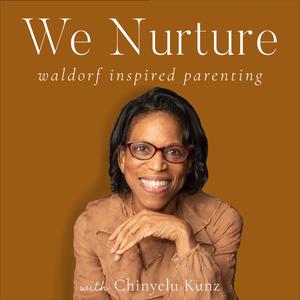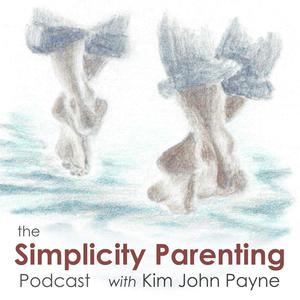
We Nurture: Waldorf Inspired Parenting
We Nurture Collective
This parenting podcast empowers parents on their journey by exploring what it means to nurture and be nurtured with mindfulness and presence. Listen to learn how you can best meet your child’s developmental needs as your child grows and develops while cultivating a nurturing, joyful home life.
- 36 minutes 32 secondsWhy Conscious Parenting Matters
Parenting wakes us up, sometimes in jarring ways especially when we begin to be more aware of our actions and behavior. In fact, it can sometimes be a surprise to us. It can be frustrating, scary, confusing and leave us feeling helpless. When we become conscious of our behavior, our words and actions we see that we actually have a choice, we can choose to raise our consciousness and live in alignment with the person we’re striving to become. Being conscious brings us closer to making the changes that we want to see in ourselves.
In this episode, I dive into talking about 10 ways you can parent with greater consciousness. The 10 ways I focus on are;
- Becoming conscious of your behavior, words, actions, and gestures.
- Working on self-development.
- Working on your personal challenges and triggers.
- Modeling behavior you want to see in your child.
- Creating healthy home rhythms.
- Slowing down and simplifying daily routines.
- Communicating clearly and limiting choices
- Being intentional with your words & limiting adult information
- Listening with interest
- Having Compassion and Empathy for your child’s big feelings
There’s a lot that I cover in this episode, including where I describe a foundation that’s needed for the young child’s healthy development.
I hope you’ll join me!
1 May 2023, 4:00 am - Becoming conscious of your behavior, words, actions, and gestures.
- 34 minutes 40 secondsCreating a Waldorf Inspired Home using the Waldorf-Home-Schooling Method
You're in for a real treat in this episode!
Listen in to my in-depth conversation with guest Catherine Read, PhD author of 'The Genius of Home' - Teaching Your Children At Home With The Waldorf Curriculum.
Catherine and I met about 30 years ago when we attended a Waldorf Playgroup at a Waldorf school in Southern California and then after moving across the country we reconnected again on the East Coast when we both moved at different years to Pennsylvania. Catherine and I share immense respect for the Waldorf method not only for the curriculum but also for how it provides wise guidance for healthy family life and a way of living.
Catherine shares her experience homeschooling her two children with the Waldorf method and how this awakened her to her own self-development and how the child awakens to the world as well as the development of consciousness during childhood. Catherine also shares how she approached homeschooling her two children and so much more!
Whether you're thinking of homeschooling and/or want incorporate the Waldorf method or way of living in your home, listening to this episode is a great starting point.
I'll be going deeper into conversation with Catherine in my upcoming webinar with her on Saturday, April 29, 2023 from 1:30 - 2:30 pm EST. All who register will receive a Replay.
Register for our upcoming webinar: Homeschooling the Waldorf Way
When: April 29th at 1:30 EST (all registrants will receive the recording)
The Genius of Home
Learn more about Catherine’s work here24 April 2023, 1:00 pm - 23 minutes 7 secondsNavigating Boundary Expectations When Parenting Together
Boundary expectations are connected to how parents choose to raise their children. The way you both think, the decisions you both make are informed, consciously or unconsciously, by what you both value and perhaps even more so, the personality traits you want to see in your child. But you both will not know what characteristics or traits are important to you unless you both talk about it. Because it takes being sensitive to each other’s perspective, communication is key. It's the best way to build a bridge of understanding and it means being sensitive to each other's perspective.
In this episode, I talk about three important steps to take and I give step and step advice to build a bridge that will help you and your spouse or partner come together with greater understanding. It's not only with boundary expectations that you will have differing opinions, there will be other aspects in parenting that will challenge how you communicate and this is why creating a foundation for how to communicate is so important.
Listen to hear more!17 April 2023, 4:00 am - 19 minutes 19 seconds#5 Finding Joy in Ordinary Days
Young children thrive in the ordinary, to them it's reliable, predictable and feels safe. There's less anxiety, less overwhelm, less to be nervous about especially when the ordinary is nourished by a healthy rhythm.
It can be hard to slow down, be present and fully embrace ordinary moments and ordinary days. How you wash the dishes, do the laundry, sweep the floor, set the table; these and more can make you feel like you're not seen and perhaps this is what makes simple, ordinary moments and days so hard.
In this episode I offer advice as well as inspiration for finding joy in ordinary days. I also tell my story of how I embraced ordinary days as a first time mom.
Here are two episodes from Season 4 that offer more on this topic.
The Key to More Joyful Days with Your Child (part 1)
https://podcasts.apple.com/us/podcast/we-nurture/id1481862269?i=1000528963100
The Key to More Joyful Days with Your Child (part 2)
https://podcasts.apple.com/us/podcast/we-nurture/id1481862269?i=100052968236410 April 2023, 4:00 am - 25 minutes 41 secondsHow to Help Your Child Have Better Sleep
For young children sleep is a sacred time that needs to be protected. Sleep is often a vulnerable time for young children and when they need us by their side. In this episode, I talk about what it means to nurture your child’s sleep as soul care. How slowing down life supports a child in "digesting" their day and also in being able to let go of the day in order to fall asleep.
I touch on emotional overload and overwhelm and what happens when we view sleep as a holistic experience.
Join me for a different, perhaps wider perspective on how to help your child have better sleep.27 March 2023, 4:00 am - 21 minutes 5 secondsHow Observing Your Child Can Make You a Better Parent
Over 30 years ago when I was first introduced to Waldorf education I heard about the immense value of observing my children and how it would help me know them better.
This concept was new to me as a valuable parenting tool. I was intrigued and decided to try it out. In this episode, I share what I learned from observing my children. I also talk about a good starting place should you choose to practice observing your child as a way to know them better.
I'm so glad you've joined me!
20 March 2023, 4:00 am - 25 minutes 36 secondsThe Benefits of Creating Rhythmical Meals
Why do rhythmical meals work? And What are the benefits?
It's no surprise that young children do best when life is consistent and dependable. They feel safe when life happens in the same way over and over and even in the same order. They want daily life to be reliable and this is one reason why rhythmical meals work. When your rhythm includes a rotation of weekly meals that your child can count on then mealtimes are more likely to go smoother. Creating a rhythm with meals will also create more harmonious family mealtimes.
Listen to hear the other benefits of rhythmical meals!
In the episode, I give some healthy snack suggestions as well as dinner ideas. I dive a little bit into seasonal eating and offer some inspiration for meal planning.
If you're intrigued and want to explore rhythmical meals in your home, we have created a FREE printable to help you get started. All you need to do is subscribe to The Journal (there's no cost to subscribe) and you'll be on the list to receive the printable. Subscribe here13 March 2023, 4:00 am - 20 minutes 45 secondsBalancing Your Needs With Your Child's Needs
Being a parent is so rewarding but also hard. There’s so much that you need to surrender to much of which you were not even aware of before having a child. Finding balance in daily life is definitely one as well as balancing your needs with that of your child’s. It’s really a constant challenge.
What does the heartbeat in your home feel like?
Do you have clear intentions for your family's lifestyle?
Is there a rhythmic heartbeat in your home?
Join me in this episode for advice and tips that will reduce overwhelm and help you navigate balancing daily life.
I've created a beautiful and unique Seasonal Family Rhythm Planner to help guide you in intentionally crafting a rhythm that aligns with the heartbeat you want for your home. The Rhythm Planner guides you step by step in creating a rhythm that will bring more balance to your days! Visit wenurturecollective.com to learn more or purchase your copy.6 March 2023, 10:00 am - 2 minutes 17 secondsSeason 7 Intro
Welcome back to the We Nurture Podcast! We are so excited to announce that Season 7 will be starting next Monday. Make sure to subscribe so you don't miss the first episode.
Subscribe to our newsletter, The We Nurture Journal, to be notified when the season has begun and to receive updates throughout the season!27 February 2023, 10:00 am - 23 minutes 9 secondsHow to Curate Outside Toys and Backyard Play and Increase Your Child's Outdoor Play
Spending time outdoors is real food for the soul, real food for the senses, as it nourishes the young child’s senses. Spending time outside helps your child breathe deeply and be better regulated.
Nature reduces overwhelm and eases tension. It will bring your child to a calm peaceful state. One of the great benefits of being out in nature is that it also gives your child time away from screens, and makes it possible for them to intimately reconnect with themselves.
Join me in this episode as I talk about the Foundational senses, outdoor activities that strengthen these senses and how you can create an outdoor play area in your own backyard with toys that you curate that will interest your child and encourage them to spend hours in play outside.
15 July 2022, 10:00 am - 17 minutes 16 secondsThe Benefits of Creating a Summer Seasonal Table
It’s Seasonal Thursday and I’m so excited to have you here today. Welcome to the We Nurture Podcast with me, your host, Chinyelu. Today, I’ll be talking about the benefits of creating a summer seasonal table for you and your child. Waldorf Education calls it a nature table and it is all about creating nature scenes that reflect what is happening outside in nature, during that season. I’ll speak to you about how a seasonal table opens up opportunities for creativity, engagement, bonding, communication, connection and care. It is a natural way to encourage outdoor play and it allows your child to connect with nature in a personal way, as you let them go about their explorations. A seasonal table is all about engaging your child’s senses, as well as strengthening your bond with them through an activity that you can do together. Bring along your child-like wonder as you tune in for this one.
Key Points From This Episode:- Being drawn to the ‘why‘ of a summer seasonal table/nature table as a young mother new to Waldorf Education.
- Encouraging an interest in and respect for the natural world.
- Helping your child learn about nature in a personal way, developing a caring attitude for the earth.
- A natural way to encourage outside play.
- How your child can get a deeper experience of exploring the world around them.
- Placing focus on allowing your child the opportunity to investigate and explore like a scientist.
- The importance of play with objects from nature and further developing the sense of touch.
- Why flowers matter and how to arrange them with your child.
- The most important aspect of creating a seasonal table: being together with your child.
- Introducing seasonal foods/recipes to your child and having them help you prepare that meal.
- Crafting with natural objects and materials.
- Having a crafted tree as a grounding presence on your seasonal table.
- Ideas on how to start a seasonal table and where to place it in your home.
14 July 2022, 10:00 am - More Episodes? Get the App
Your feedback is valuable to us. Should you encounter any bugs, glitches, lack of functionality or other problems, please email us on [email protected] or join Moon.FM Telegram Group where you can talk directly to the dev team who are happy to answer any queries.
 Respectful Parenting: Janet Lansbury Unruffled
Respectful Parenting: Janet Lansbury Unruffled
 WILD + FREE
WILD + FREE
 The Simplicity Parenting Podcast with Kim John Payne
The Simplicity Parenting Podcast with Kim John Payne
 The 1000 Hours Outside Podcast
The 1000 Hours Outside Podcast
 Waldorfy
Waldorfy